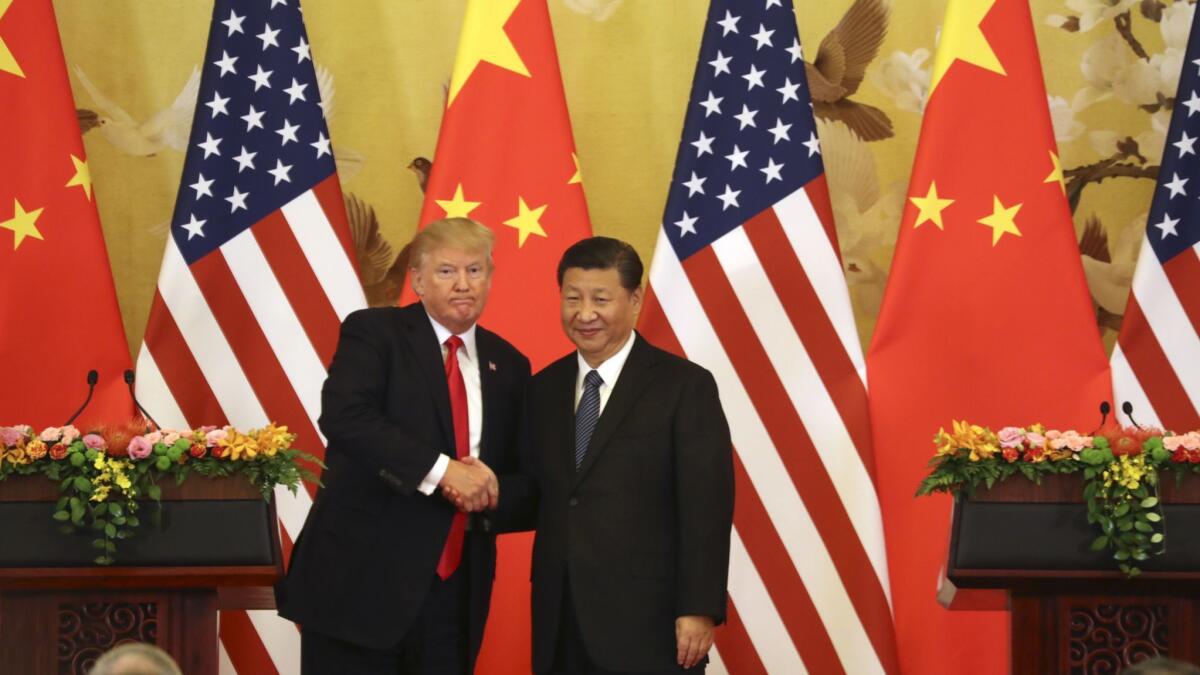Op-Ed: One foreign policy move Trump is getting right — maintaining Obama’s pivot to Asia

Donald Trump doesn’t get much praise for his foreign policy triumphs. There is a reason for that. Most of his foreign policy adventures to date have been disasters.
It would be especially surprising to praise the president for his diplomatic efforts this week. Amid the collateral damage of deepening trade wars, the president has exacerbated tensions with U.S. allies at the NATO summit, faced unprecedented protests in Britain, prepared to cozy up to Russia — an adversary that continues to attack Western democracies — and has generally done all he could to undermine the international system that has been the foundation of global stability and prosperity for the past seven decades. Oh, and it has become increasingly clear that his Nobel Prize-worthy “triumph” in Singapore with North Korea was a sham.
So, not good.
And yet implicit in Trump’s actions has been an important strategic shift, one that the president has to some degree successfully furthered: the recognition that America’s trans-Atlantic security interests are being eclipsed by those in the Pacific, and that we need not only to prioritize those interests but also to formulate new national and international security structures to deal with them.
China’s trajectory will likely make it the most formidable rival the U.S. has ever faced.
Trump has emphasized the U.S.-China relationship with high-level meetings and regular dialogue with Xi Jinping. He has acknowledged the threat posed by a nuclear North Korea, and his administration has sought to use regional diplomacy to try to rein in that threat. The administration has also recognized the importance of developing a 21st century U.S.-led alliance in the region by encouraging the formation of the “Quad”: Australia, Japan, India and the United States.
The Trump administration has even embraced a conceptual change by adding South Asia to the Pacific region in nomenclature: U.S. Pacific Command is now the Indo-Pacific Command. This may seem a small thing, but it is vital to recognize India’s role in establishing a healthy balance with China in the region.
It is unlikely that Trump has spent one nanosecond thinking about any of this in terms of a coherent foreign policy strategy. (As evidence: the wild swing from near war to hype with North Korea, the trade battles with China that not only undermine the relationship he is bumbling toward but will also cost Americans dearly, withdrawal from the Trans-Pacific Partnership and the Paris climate accords.) Nonetheless, the underlying shift is sensible and it builds on President Obama’s “rebalancing to Asia.”
You would think Trump would be undoing rather than aiding a shift associated with his enemy, Obama. That it is happening nonetheless is one more sign that “strategy” may be too strong a word here. It also underscores a crucial element of the Asia rebalance: America’s turn toward the Pacific is a result of historical trends as much as the deeds of one man or one party. Augmented by professionals in the security establishment who are aware of those forces, the shift is a reminder that very often U.S. foreign policy is driven more by what is “foreign” than by “policy”— that is, it is shaped by forces beyond our control.
(The corollary to the great man theory of history — in which larger-than-life figures bend events to their will — is the small man theory of history, in which minor figures like Trump are swept along by the tides of time.)
Enter the Fray: First takes on the news of the minute from L.A. Times Opinion »
Rebalancing to Asia in no way requires the U.S. to undermine important ties across the Atlantic or elsewhere, as Trump has done. Nor does it suggest we should weaken ourselves, as he is doing, by damaging the international system and alliances that have reinforced and multiplied America’s strength and influence.
Quite the contrary, the challenges of the Indo-Pacific require the U.S. to shore up its global diplomatic and security infrastructure. China’s trajectory will likely make it the most formidable rival the U.S. has ever faced. Our long-standing global relationships, and the international institutions the U.S. has spent decades building, will be vital assets in counter-balancing China’s vitality and its aggressive efforts to forge its own global links.
Even amid the welter of Trump’s foreign policy missteps, embarrassments and calamities, we should be willing to acknowledge that his administration has made some sensible moves.The Indo-Pacific shifts will need to be nurtured in the post-Trump future. Consider it an example of what might be called the Blind Squirrel Doctrine in international affairs — every so often even a blind squirrel finds an acorn.
David Rothkopf is a visiting scholar at the Carnegie Endowment for International Peace, host of the “Deep State Radio” podcast and an author of many books on international affairs.
Follow the Opinion section on Twitter @latimesopinionand Facebook
More to Read
A cure for the common opinion
Get thought-provoking perspectives with our weekly newsletter.
You may occasionally receive promotional content from the Los Angeles Times.





